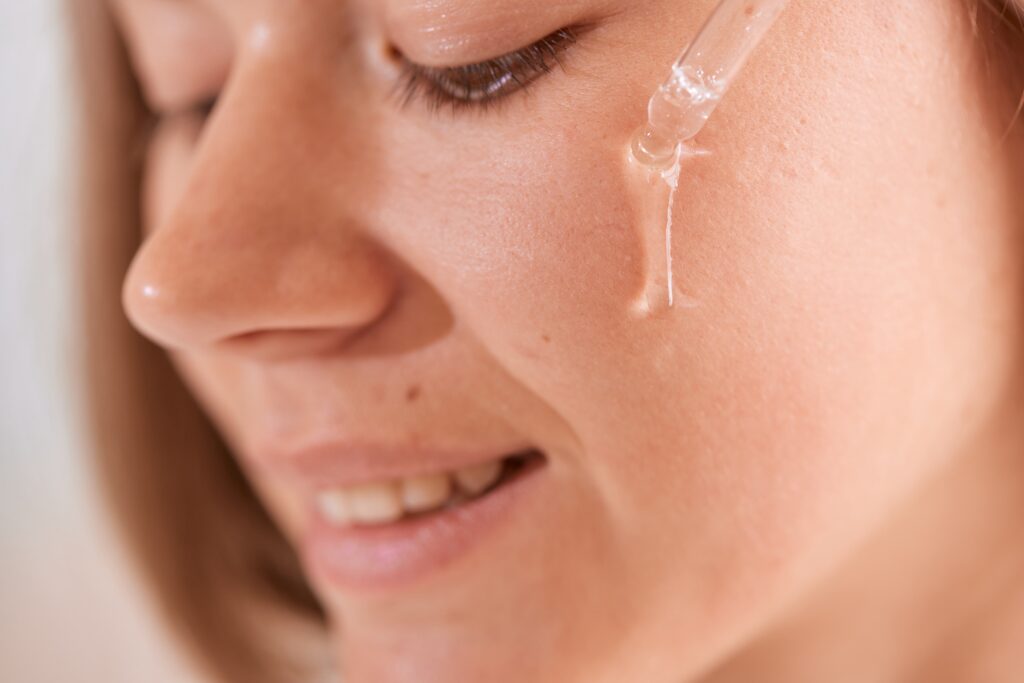When it comes to skincare and skin remedies, it seems like every ingredient out there has its moment on social media. When it comes to “all-natural products” like oils, how can you sift through the claims to know if castor oil removes wrinkles, or olive oil is just like Vitamin C, or coconut oil can reduce razor burn?
Should you be using these products at all, let alone directly on your skin? And if you should use them, where, when, and for what?
Oil Facts: How Much Do We Know?
Before you move the olive oil from the kitchen counter to the bathroom vanity, remember that anything that goes on the skin goes into the body. That means you need to be thoughtful about sensitivities like allergies.
The other key fact to know about any natural remedy is that generally, it’s hard to find scientific studies to prove or disprove the claims.
“You’ll definitely find plenty of videos and articles out there,” said Dr. Alison Boudreaux, board-certified dermatologist of Calkin & Boudreaux, a GSD Affiliate, “but keep in mind that many of those aren’t based on randomized, clinical trials. That doesn’t mean you should avoid natural products; it simply means that we don’t have as much information as we do on other ingredients.”
The Oil Advantages
Each of these oils (coconut, olive, and castor) comes from natural, renewable sources. For people looking for fewer chemicals in their skincare products, it’s definitely worth understanding them. They’re also widely available and generally inexpensive — another plus.

What to Look for
- With any oil, you want to keep it as pure as possible. Look for the virgin, organic versions, with no additives.
- Do a test patch first, since – as with any product – you may have allergies you weren’t aware of.
- Use sparingly. These oils are all pretty heavy, so you won’t want to swap your body moisturizer for a bottle of olive oil! They can also stain clothing or sheets, so be careful about when and where you apply them.
Castor oil: Benefits and Bewares
Castor oil is extracted by cold-pressing a certain kind of seed and then applying heat. While it’s sometimes still used as a laxative, its primary use is in cosmetics.
Ricinoleic acid, a fatty acid with moisturizing abilities, is what gives castor oil its benefits. It’s also been found to have antimicrobial and anti-inflammatory properties.
Beyond simply moisturizing skin, castor oil can:
- Fight free radicals: Castor oil joins the category of Vitamin C and other antioxidants to help battle free radicals that can damage skin and cause cancer. “We always recommend that people double-up on both an antioxidant and sunscreen,” said Dr. Boudreaux. “Free radicals cause damage both on the skin and in the body that you can’t see. Double protection for your skin, even on a cloudy day, is one of the key preventive measures we can all take.”
- Battle bacteria: Given its antibacterial properties, castor oil can help with bacteria that clogs pores and leads to acne.
- Reduce inflammation: The anti-inflammatory abilities can help reduce swelling from injuries, under-eye puffiness, or inflamed pimples.
- Soothe lips: Castor oil is a common ingredient in lip balms. You may want to mix it with another oil, or simply look for it as a main ingredient instead of applying it directly (it’s quite slippery and doesn’t taste very good!).
Beware of
Castor oil can be quite thick, which makes it better for spot treatment versus overall application.
Olive Oil
A key food ingredient and beauty product for thousands of years, olive oil is packed with multiple benefits.

Olive oil can:
- Moisturize the skin: Squalene and vitamin E giveolive oil its moisturizing capabilities. Squalene helps the skin retain moisture it already has, while vitamin E increases the skin’s capacity to absorb and retain water.
- Fight free radicals: Just like castor oil and Vitamin C, olive oil is another option to protect both your skin and your body.
- Deliver vitamins: Olive oil also contains the fat-soluble vitamins A, D, and K. While it’s best to absorb vitamins through food, you can still get some benefits from topical application. Retinol is a form of Vitamin A that promotes cell turnover. Vitamin D has multiple benefits, from calming inflammation to helping skin stay hydrated. Vitamin K is all about helping the skin recover.
- Treat certain skin conditions: Because of the vitamin content and its antibacterial qualities, olive oil can be used to treat a variety of skin conditions, including psoriasis and eczema. One study has shown it to be helpful for people with foot ulcers caused by type 2 diabetes.
Beware of:
Are there any “bewares” for olive oil? Yes. It’s quite a heavy oil, and as such should be used sparingly. And if you have naturally oily skin, it may not be a good fit.
Coconut Oil
Unlike castor oil, we can all figure out where coconut oil comes from! While olive oil has been a staple in the kitchen for years, coconut oil is a more recent addition. So, should you put it on your skin as well as into your food?
Topically, coconut oil can:
- Hydrate the skin: When too much of your skin’s natural moisture evaporates (known as trans epidermal water loss), it can lead to dry skin. For those who have eczema, rosacea or dermatitis, the more moisture you can keep in the skin, the better.
- Soothe irritation: Coconut oil contains linoleic acid, an unsaturated omega-6 fatty acid that functions as an emollient (meaning it soothes your skin).
- Battle bacteria: Lauric acid, which makes up 49% of coconut oil, has antimicrobial and antifungal properties. It’s not sufficient to treat wounds, but it can be helpful with minor abrasions or scratches, like razor burn.
Beware of:
Coconut oil is comedogenic, which means it can clog your pores. While it can moisturize, it’s best not to use it on your face.
“As with anything you put onto or into your body,” said Lam Le, PA-C, certified physicians assistant at Golden State Dermatology in Brentwood, Merced, and Modesto, “it’s best to understand what you want to accomplish, and how that product can help – or potentially hurt. We’re happy to talk through options and find a solution that’s right for you.”
If you have questions about what products are best for your skin, schedule an appointment at a Golden State Dermatologist’s office near you. In addition to board-certified dermatologists, our staff also includes esthetician services. We’ll talk through your questions to come up with a customized approach for you and your skin health.



